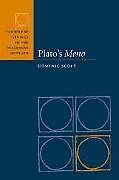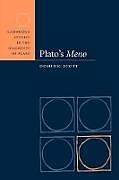Plato's Meno
Einband:
Fester Einband
EAN:
9780521640336
Untertitel:
Englisch
Autor:
Plato
Herausgeber:
Cambridge University Press
Anzahl Seiten:
252
Erscheinungsdatum:
25.10.2007
ISBN:
0521640334
This book confronts Plato's many enigmas in his philosophical text Meno.
Autorentext
Dominic Scott is Senior Lecturer in Philosophy at the University of Cambridge and a Fellow of Clare College. His previous publications include Recollection and Experience: Plato's Theory of Learning and its Successors (Cambridge University Press, 1995).
Klappentext
For a relatively short dialogue, Plato's Meno covers an astonishingly wide array of topics. Politics, education, virtue, and the immortality of the soul, are all given a profound but tantalizingly brief treatment, leaving many unresolved questions. In a new departure, this book confronts the many enigmas that face readers of the Meno by focusing on the dialogue in its own right and not merely on it within the context of Plato's other dialogues. In so doing, it offers new insights that are both lucid and sympathetic to Plato's philosophy.
Zusammenfassung
In a new departure, this book's exploration of Plato's Meno focuses primarily on the content and coherence of the dialogue in its own right and not merely in the context of other dialogues, making it required reading for all students of Plato, be they from the world of classics or philosophy.
Inhalt
Introduction; Part I: 1. The opening: 70a-71d; 2. The first definition: 71e-73c; 3. A lesson in definition: 73c-77d; 4. The third definition: 77b-79e; 5. Meno as interlocutor; Part II: 6. The stingray: 79e-80d; 7. 'Meno's paradox': 80d-81a; 8. The emergence of recollection: 81a-e; 9. The argument for recollection: 82b-85d; 10. The conclusion: 86b6-c2; Part III: 11. The method of hyposthesis: 86c-87c; 12. Virtue is teachable: 87c-89c; 13. Virtue is not teachable: 89e-96d; 14. Virtue as true belief: 96d-100b; 15. Irony in the Meno: the evidence of the Gorgias; 16. Meno's progress; Conclusion; Appendices; References; Indexes.

Leider konnten wir für diesen Artikel keine Preise ermitteln ...
billigbuch.ch sucht jetzt für Sie die besten Angebote ...
Die aktuellen Verkaufspreise von 6 Onlineshops werden in Realtime abgefragt.
Sie können das gewünschte Produkt anschliessend direkt beim Anbieter Ihrer Wahl bestellen.
Loading...
Die aktuellen Verkaufspreise von 6 Onlineshops werden in Realtime abgefragt.
Sie können das gewünschte Produkt anschliessend direkt beim Anbieter Ihrer Wahl bestellen.
| # | Onlineshop | Preis CHF | Versand CHF | Total CHF | ||
|---|---|---|---|---|---|---|
| 1 | Seller | 0.00 | 0.00 | 0.00 |
